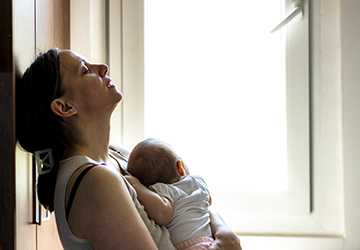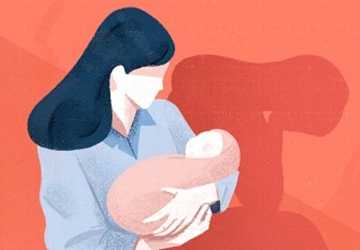Most women face an increase in their emotions right after the delivery of their child. Having a newborn is a pleasurable experience, but it can negatively impact some women due to sudden shifts in their responsibilities or sometimes due to changes in hormones in their bodies.
Imagine this: you've just brought your little one into the world, and while it's a beautiful experience, it can also throw your life and hormones into a tailspin.
You're navigating this overwhelming mix of joy, exhaustion, and uncertainty, and it's normal to experience a rollercoaster of emotions during this time. But sometimes, those sadness, anxiety, or feeling 'off' can tip into something more serious.
And that's what we call Postpartum Depression, or PPD for short.
Now, don't panic. I've put together this blog post to help you understand PPD better, with some assistance from medical professionals.
Let's get into it, shall we?

What is Postpartum Depression?
Postpartum depression (PPD) can feel like a hidden and unwelcome guest in the life of some women after childbirth. It cloaks them in a lingering shroud of sadness, anxiety, and fatigue, making even the simplest tasks—like caring for themselves and their new baby—seem monumental.
PPD often tiptoes into life, typically between one to three weeks post-delivery. It's not a guest that leaves alone—it necessitates intervention and treatment.
PPD is, unfortunately, the most common postpartum issue for women, affecting between 6.5 and 20% of new moms, according to the National Library of Medicine.
But here's what you must remember—if you're entangled in the grip of PPD, it's not a mark of your failure. It doesn't brand you as flawed or label you a subpar mother. PPD is a medical condition, and it's no different than catching a cold or breaking a bone—it deserves empathy, understanding, and, most importantly, treatment.
If you suspect PPD's shadow is darkening your life, don't hesitate to contact your healthcare provider. Remember, asking for help is the bravest thing you can do—for yourself and your little one.
Symptoms of Postpartum Depression
It isn't uncommon to experience the symptoms of PPD, such as baby blues, feelings of sadness, emptiness, moodiness, or exhaustion a few days after giving birth.
But if you pass through PPD, these feelings persist and can be so severe they interfere with your daily life.
If you're not attracted to your baby or don't want to love the little angel, you may pass through the PPD phase. Other symptoms to watch out for include:
●Overwhelming depression or emotional turmoil
●Thoughts of harming yourself or your baby
●Lack of interest in your child
●A constant feeling of exhaustion, guilt, or worthlessness
●Changes in your relationship with food
●Anxiousness, constant headaches, aches, or stomach issues
Let's talk about the risk factors of PPD.
Postpartum Depression's Risk Factors
It's a complicated condition and can have different triggers for different people. Some of these might include:
●A history of depression, either before pregnancy or during it
●Age at the time of conception (younger moms may be at higher risk)
●Ambivalence about the pregnancy
●Having multiple children
●A family history of mood disorders
●Going through a significantly stressful event like job loss or health issues
●Having a child with special needs
●Being pregnant with multiple
●A history of depression or premenstrual dysphoric disorder (PMDD)
●Lack of social support
●Living alone
●Marital discord
There isn't a single cause of PPD, but a few factors can contribute to it:
●Hormones: You know what's a real roller coaster? Hormones! Particularly after childbirth, when your levels of estrogen and progesterone take a nosedive. This sudden drop can play a significant role in PPD. And it's not just those two - a whole host of other hormones from your thyroid gland also decline, which can leave you feeling like you're wading through molasses, all tired, slow, and blue.
●Lack of sleep: Now, onto the delightful topic of sleep or, more accurately, the lack thereof. Oh, those adorable newborns, bless them! They're just not big on letting you have long, peaceful stretches of z's, are they? Even tackling minor problems can feel like climbing a mountain when running on fumes. I can't blame them, though; they're just being babies.
●Anxiety: The pressure and worry of caring for your baby can feel overwhelming. This constant anxiety can, over time, contribute to developing PPD.
●Self-image: You may struggle with body changes or feel less attractive after giving birth. Identity issues or a lack of control over your life can also play a role in PPD.
Remember, if you feel you may be dealing with PPD, you're not alone, and help is available. Reach out to a healthcare professional. You don't have to navigate this challenging time by yourself.

5 Step Guide to Healing from Postpartum Depression
When it comes to treating postpartum depression (PPD), don't hesitate to consult with a healthcare provider. They are your compass to guide you out of the woods.
In PPD treatments, counseling, medications, and support groups form the trio of trust. They can support you on your road to recovery. Often, a blend of medicine and therapy offers the best results.
●Medications: Antidepressants are typically the go-to treatment for PPD. They can help manage your depression symptoms, although they usually need about 6 to 8 weeks to flex their full power. Like all superheroes, they have their kryptonite – side effects can include agitation, digestive issues, or headaches. If you're breastfeeding, don't worry – your doctor can recommend safe options.
●Hormone Treatment: The plummet of estrogen and progesterone levels after childbirth may trigger PPD in some women. Consequently, hormone therapy might be a worthy ally. However, side effects may include weight fluctuation, stomach pain, headaches, and hair loss.
●Therapy: Cognitive behavioral therapy (CBT) could be your secret weapon. It significantly reduced PPD symptoms, especially when combined with medication. It's like a mind boot camp, helping you to reframe your thoughts, spot cognitive distortions, and boost your self-confidence.
●Natural Remedies: PPD is severe, so it's important not to try and go it alone. But along with conventional treatments, some at-home activities might offer a boost. Eating a balanced diet, exercising gently, practicing yoga or meditation, or soaking up sunshine outdoors can work wonders. Consider these your wellness sidekicks.
●Self-care: PPD can be like a Dementor from Harry Potter, sucking away your energy and leaving you feeling isolated. So, self-care is your Patronus Charm. Reach out to your family and friends and ask for help when needed. You can also join a support group. Remember, it's okay to lean on others – that's what they're there for.
Remember, you're not alone on this journey. Reach out, seek help, and give yourself grace. Healing takes time, and that's perfectly okay.
Conclusion
Postpartum depression is a severe issue that should not be overlooked. The five ways mentioned above of treatment will help you to deal with it.
Women who go through PPD after childbirth must give proper medication and other treatment provided above according to the severity of their condition after consulting a healthcare professional.
Remember that if you're going through Postpartum depression, it's not your fault. So don't blame yourself and focus on getting rid of this.



